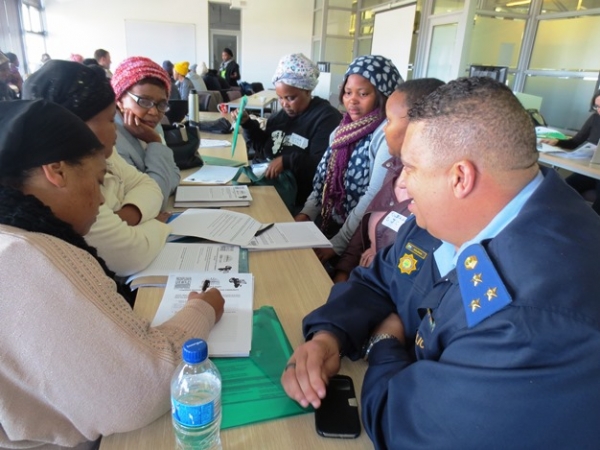Khayelitsha residents stuck with severe lack of police resources

Eleven months after the Khayelitsha Commission of Inquiry into policing released its finding that the South African Police Service (SAPS) allocation of resources was unfair and irrational, the situation has hardly improved. Khayelitsha residents still suffer from a severe lack of police resources and there are still reports of poor communication and distrust between the police and the community.
This emerged on Thursday, when the Social Justice Coalition (SJC), Ndifuna Ukwazi, the Community Law Centre, and the Civil Society Prison Reform Initiative held a seminar on resourcing for effective community policing at the University of the Western Cape. About 200 people gathered at the Life Science building.
Director of Ndifuna Ukwazi Zackie Achmat said high security is used to enforce removing people from land, instead of making the land safer.
[The Commission}(http://www.groundup.org.za/news/coi) had been mandated to investigate complaints relating to allegations of inefficiency of the police stationed at three police stations as well as other units of SAPS operating in Khayelitsha. The Commission recommended that the resource allocation system be revised, not just for Khayelitsha, but on a national level.
Achmat said that for eight years they have asked for a police station to be built in Makhaza and it has not happened. He said Harare police station is dealing with huge areas including Endlovini, Kuyasa and Makhaza. Even though the community has a duty to assist the police, they cannot, because there is a lack of policing, he said.
“We are running out of patience and it is time we put more pressure on government,” said Achmat.
He also made it clear that the minister of police had been invited to the seminar but had not responded to the invite.
“We must ensure that we get visible policing and sector policing in the informal settlements,” he said.
The Western Cape Community Law Centre’s Jean Redpath said a number of cases are never reported to the police as people have lost faith in them.
Hanif Loonat of the Community Police Forum (CPF) agreed with Achmat that there was a lack of resources. He said the CPF must also be given attention and more training. Even though the CPF was doing all it could there were certain boundaries that they could not cross.
Achmat said it was clear that nothing has been done since the findings of the commission, but having the commission had helped them to established joint forums to deal with crime research and vigilantism among other issues.
Blikkiesdorp resident Waleed Heyn asked if the same initiative could be done in his area. He said in Blikkiesdorp crime was escalating daily and the police were doing nothing.
The seminar ended with a group discussion. Among the suggestions made were for more streetlights, more police stations, and the use of CCTV.
Next: Protest turns ugly and mayor snubs memorandum
Previous: How I was “ransomed” hitching back from Zimbabwe

This article is licensed under a Creative Commons Attribution-NoDerivatives 4.0 International License.


